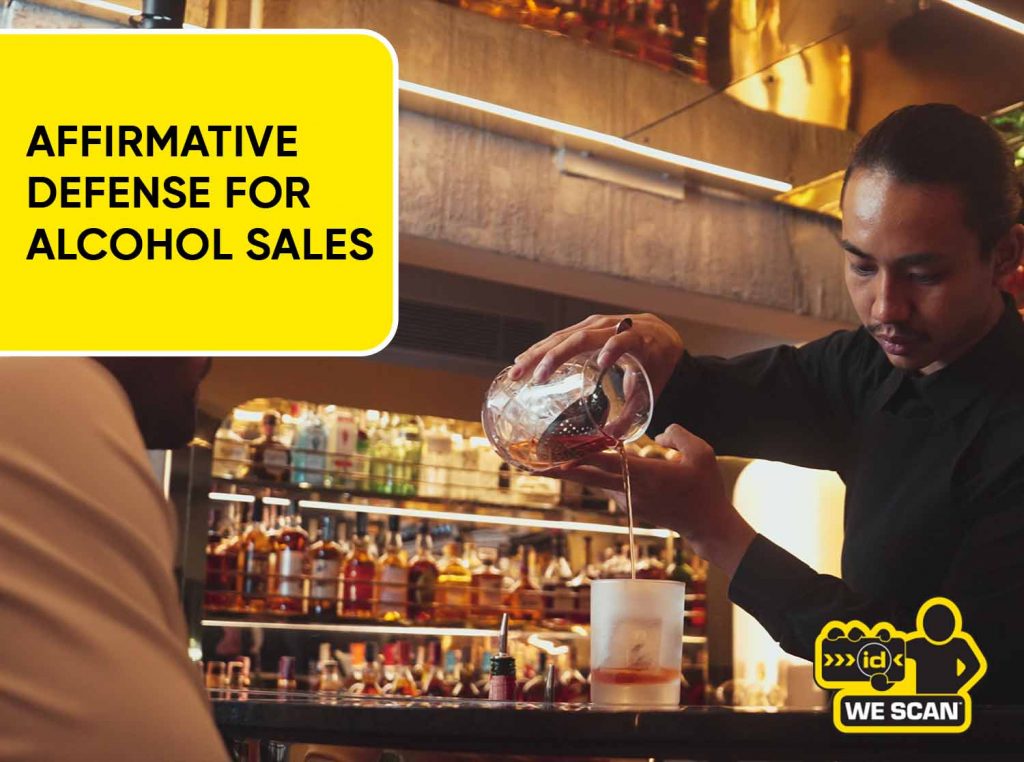Selling alcohol comes with significant legal responsibilities, and even the most diligent businesses can face violations when sophisticated fake IDs or deceptive customers bypass their defenses. An affirmative defense offers crucial protection for alcohol vendors who can demonstrate they followed all reasonable procedures to prevent illegal sales, even when violations occur due to circumstances beyond their control.
This comprehensive guide explains how affirmative defense works, when it applies, and how to build robust compliance systems to protect your business from fines, license suspensions, criminal charges, and civil lawsuits. You’ll learn the essential requirements for qualifying for this legal protection, including proper employee training, technology implementation, written policies, and documentation systems.

We’ll cover real-world scenarios where affirmative defense can save your business, common mistakes that invalidate this protection, and the serious consequences of operating without adequate compliance measures. Whether you’re a restaurant owner, bar manager, or retail store operator, understanding and implementing affirmative defense strategies is essential for protecting your business, preserving your liquor license, and maintaining a culture of responsible alcohol service.
The stakes are high in alcohol sales—but with the right knowledge and systems in place, you can confidently serve customers while minimizing legal risks and safeguarding your business’s future.
What Is Affirmative Defense for Alcohol Sales?
Affirmative defense for alcohol sales is a legal protection that allows a seller or server of alcohol to avoid penalties if they can prove they took all reasonable and lawful steps to prevent an illegal sale, particularly to a minor or an intoxicated person. It does not deny that the sale occurred but instead provides justification based on the seller’s good-faith efforts to comply with the law.
This defense is especially important when, for example, a minor uses a convincing fake ID. If the business can show that employees followed proper procedures—such as checking identification, using ID-scanning technology, or completing Responsible Beverage Service (RBS) training—it may qualify for protection under affirmative defense.
Affirmative defense plays a critical role in protecting alcohol vendors from both criminal and civil penalties. Without this defense, a business might face fines, suspension of its liquor license, or lawsuits, even if the violation occurred due to circumstances beyond its control. When due diligence is clearly documented and procedures are consistently followed, affirmative defense can help prevent these legal consequences.
Importance of Affirmative Defense for Alcohol Sales

Affirmative defense is an essential legal protection for businesses that sell or serve alcohol. It provides a way to defend against penalties when a violation occurs despite the seller or server following all required procedures. In industries where compliance is heavily regulated, having this defense in place can mean the difference between a manageable issue and a devastating legal or financial consequence.
Here are key reasons why affirmative defense is vital:
- Protects Your Business License: A single violation, such as accidentally serving a minor, can jeopardize your liquor license. Affirmative defense can help preserve your ability to operate if you can prove that your staff followed proper procedures.
- Reduces Legal Liability: In cases involving underage sales or service to intoxicated individuals, affirmative defense can protect your business from criminal charges, fines, or civil lawsuits.
- Encourages a Culture of Compliance: Since the defense relies on following specific steps, it promotes better training, stronger policies, and a more responsible staff culture, lowering the chances of future violations.
- Shows Good-Faith Effort: If your staff can demonstrate that they checked IDs properly and followed company policies, it shows regulators that your business is acting responsibly and not intentionally breaking the law.
- Offers Peace of Mind: With the right systems in place, owners and managers can feel confident that their business is protected if something goes wrong despite their best efforts.
Affirmative defense is not a free pass, but it is a valuable shield for businesses that are proactive about compliance and take their responsibilities seriously.
Example: Sale to a Minor with a Fake ID
A 19-year-old uses a sophisticated fake ID that passes an ID scanner and fools a trained cashier who follows all proper verification procedures. When police later discover the fake ID, they cite the store for selling to a minor.
The store’s affirmative defense argues that, despite the violation, it shouldn’t face penalties because the employee was properly trained, followed written policies, used verification technology, and the fake ID was sophisticated enough to deceive a reasonable inspection.
This defense doesn’t deny the sale occurred—it argues that the store’s good-faith compliance efforts should shield it from liability when victimized by sophisticated deception beyond its control.
When Can Affirmative Defense Be Used?
Affirmative defense can be used in specific situations where alcohol is sold in violation of applicable law or statute. One of the most common scenarios is the sale of alcohol to a minor who presents a realistic-looking fake ID. If the ID appears valid and the employee checks it properly, the business may be protected from liability under affirmative defense.
To successfully use this defense, certain conditions must be met, including:
- The ID was presented voluntarily by the buyer.
- The seller made a reasonable effort to verify the ID.
- The ID appeared legitimate and unaltered.
- The seller had a good-faith belief that the buyer was of legal drinking age.
- The sale was made in the ordinary course of business, without intent to break the law.
Some states also require that businesses use ID-scanning technology or maintain logs of ID checks to qualify for this protection. Proper staff training, clear company policies, and documented proof of compliance can further strengthen the defense.
The availability and specifics of affirmative defense vary by state. For example, some states have stricter requirements or may not recognize this defense at all. Businesses should consult local or state alcohol regulatory authorities to understand how affirmative defense applies in their jurisdiction. Consulting a legal expert or compliance advisor is highly recommended to ensure full understanding and implementation.
How to Build a Strong Affirmative Defense
To effectively use affirmative defense and protect your business from legal consequences, it’s essential to have a clear and well-documented compliance strategy. A strong affirmative defense is built on four key pillars: employee training, technology tools, written policies, and proper documentation.
Employee Training
All staff involved in the sale or service of alcohol should complete Responsible Beverage Service (RBS) training or a similar certified program. This training helps employees understand the legal responsibilities of serving alcohol, how to identify fake IDs, how to handle refusals, and the importance of consistent age-verification practices. Training completion should be documented and regularly refreshed.
Technology Tools
Investing in ID scanners and point-of-sale (POS) systems with verification alerts can significantly reduce human error. These tools help confirm the authenticity of IDs and provide real-time feedback to staff. Many systems also store scan data, creating an audit trail that can support your defense if a violation occurs.
Written Policies
Establish clear Standard Operating Procedures (SOPs) for age verification and alcohol sales. These should include steps for checking IDs, identifying red flags, and handling difficult situations. Post visible signage about ID requirements and underage sales laws. Consistent policies ensure that all staff follow the same procedures, minimizing the risk of noncompliance.
Documentation
Keep detailed records of compliance efforts. This includes logging all ID scans, maintaining refusal logs when service is denied, and storing copies of staff training certifications. Accurate documentation strengthens your affirmative defense and shows regulators that your business takes alcohol compliance seriously.
What Does Not Qualify as Affirmative Defense?
While affirmative defense can protect alcohol vendors in specific situations, it applies only when the business has taken all reasonable steps to comply with the law. Failing to meet these standards can invalidate the defense and expose your business to legal penalties. Below are common mistakes that do not qualify for affirmative defense:
- Ignoring Expired or Obviously Fake IDs: If a staff member accepts an ID that is expired, clearly tampered with, or obviously fake, the business cannot claim affirmative defense. Sellers are expected to examine IDs carefully and refuse service if the identification appears suspicious.
- Relying Solely on Verbal Confirmation: Asking a customer for their age without verifying it with a valid ID is insufficient. Taking someone’s word that they are of legal age does not meet the requirements for affirmative defense and will not hold up during an investigation.
- Lack of Staff Training or Documentation: Affirmative defense requires proof that employees have been properly trained in alcohol compliance. Without records of Responsible Beverage Service (RBS) training, ID verification policies, or internal procedures, the defense will likely be rejected.
- Serving an Already Intoxicated Person: Even if an ID is valid, serving alcohol to someone who is visibly intoxicated is illegal in most jurisdictions. Affirmative defense typically does not apply in these cases, as staff are expected to recognize and respond appropriately to signs of intoxication.
To ensure that your business can use affirmative defense effectively, it is critical to follow proper ID-verification procedures, train your team, and maintain thorough records. Skipping these steps leaves your business unprotected and vulnerable to serious consequences.
Legal Consequences Without Affirmative Defense
Failing to implement or qualify for an affirmative defense can expose your business to serious legal and financial consequences. When a violation occurs without proof of due diligence, regulators and courts are more likely to impose penalties. Here are the potential risks:
- Fines, License Suspension, or Revocation: Alcohol regulatory agencies can issue substantial fines for violations such as selling to minors or intoxicated individuals. Repeated offenses or serious incidents may lead to the suspension or permanent revocation of your liquor license, jeopardizing your entire business.
- Criminal Charges: In many states, selling alcohol to a minor or a visibly intoxicated person can result in criminal charges for the employee involved, the manager, or even the business owner. This could lead to court appearances, probation, or, in some cases, jail time.
- Civil Lawsuits: Without an affirmative defense, your business may face lawsuits from individuals or families affected by illegal alcohol sales. In dram shop liability cases, for example, a business can be held financially responsible if an intoxicated person causes injury or damage after being served alcohol at your establishment.
These consequences can damage your reputation, drain your finances, and, in some cases, shut down your business entirely. Implementing compliance protocols and maintaining the ability to claim affirmative defense is not just a legal safeguard—it is essential for protecting your business long-term.
Final Tips for Alcohol Vendors

Running a successful and compliant alcohol-serving business requires more than just good service—it demands constant attention to legal responsibilities. Here are some final tips to help alcohol vendors minimize risk and strengthen their ability to use affirmative defense if needed:
- Make ID Checks Non-Negotiable: Every customer who appears underage should be asked for valid identification, with no exceptions. Consistently enforcing this policy creates a safer environment and protects your business from violations.
- Invest in Staff Training and Compliance Tools: Ensure all employees complete certified Responsible Beverage Service (RBS) training or equivalent programs. Equip your team with tools like ID scanners and POS systems with verification features to support informed decisions during service.
- Keep Accurate Records: Document all ID checks, refusal incidents, staff training certifications, and compliance measures. These records can be critical in proving that your business acted in good faith if a violation is alleged.
- Stay Updated with Local Alcohol Laws: Regulations for alcohol sales vary by state and even by city. Regularly review local laws and update your internal policies to remain compliant.
This article is for informational purposes only and does not constitute legal advice. For guidance specific to your situation or jurisdiction, please consult a qualified attorney.

